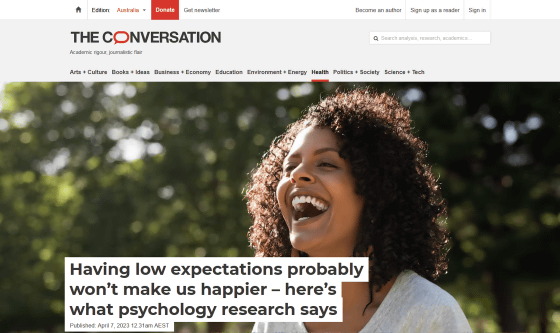Should I underestimate my expectations to be happy?

``How can I live happily?'' is a big question for humans, and various answers have been given so far. Some people have the idea that 'if you don't expect anything, or at least set your expectations low, you'll feel happy even in the littlest things
Having low expectations probably won't make us happier – here's what psychology research says
https://theconversation.com/having-low-expectations-probably-wont-make-us-happier-heres-what-psychology-research-says-203084

In 2023, Finland will take first place for the sixth consecutive year in the World Happiness Report happiness ranking. Various reasons have been proposed as to why Nordic countries continue to rank in the top, such as `` income equality '' and ``time spent in nature' '.
But Jukka Savolainen, a professor of sociology from Finland, argues that Finland's high level of happiness is due to 'a cultural orientation that puts practical limits on 'expectations of the good life'.' I will . In other words, Finnish people underestimate their expectations, so they feel happy.
In response to this theory, Burke said, 'Should we lower our expectations to be happier? I argue that psychological research suggests the opposite.' He argues that people should not underestimate their expectations in trying to be happy.

Burke points out that high expectations for the future are important for creating goals to dream and aim for. People judge their expectations for the future through a process called
For example, if you dream of a life surrounded by many friends, but in reality you feel sad that you are lonely, mental contrast predicts the dreams you want to fulfill and the potential obstacles to make your dreams come true. It helps you plan actions like 'go to the club and talk to someone' to In other words, expectations, when realistic, have the power to motivate positive change.
Also, the expectation that things will work out in the end is what motivates people in adversity to keep moving forward. For example, a person who has the expectation that ``someday you will meet a lifelong partner,'' can start looking for a meeting again even if they break up with one partner.

However, too low expectations can limit your ability to improve your situation and lead to
What matters is not only the expectations you have of yourself, but also those who have expectations of others tend to perform better. It's called the Pygmalion effect , and when other people think you're a competent, high-performing person, you're more likely to try to live up to their expectations. On the other hand, when expectations from others are low, performance tends to decline.

Having expectations generally has a positive effect, but setting expectations too high may have an adverse effect. Burke points out that overestimating your skills, challenging unreasonable goals and failing can lead to frustration and anxiety.
To avoid this problem, simply set your expectations to match your skills. For example, if you try and fail at a dinner party that is too difficult, you may not be able to enjoy the party. To avoid this, it's effective to lower the difficulty level of the food you serve at the party a little, and make it more enthusiastic than usual, but less likely to fail.
``One of the reasons we don't have high expectations of ourselves is that we want to protect ourselves from disappointment when our hopes aren't met, which is a valid concern,'' Burke said. Learning to control your emotions when they strike will help you deal effectively with adversity.In terms of motivating you to set and achieve goals, the benefits of high expectations come from low ones. Considering these things, I think it's too naive to think that Finns are happy because they have low expectations.'

Related Posts:
in Note, Posted by log1h_ik







